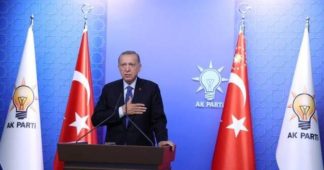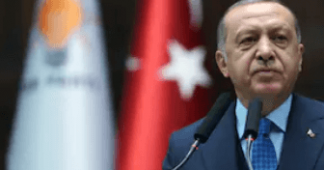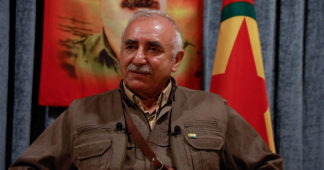By Harut Sassounian*
Dec 16, 2024
For many years, up until the Syrian civil war of 2011, Syria and Turkey enjoyed very close relations. In a series of reciprocal visits, Pres. Bashar al-Assad made a historic trip to Ankara in 2004, the first Syrian president to do so. Then-Prime Minister Recep Tayyip Erdogan visited Damascus to sign a free trade agreement. In 2007, Erdogan and Assad attended the opening ceremony of the Aleppo International Stadium. Trade flourished with visa-free travel. In 2008, Erdogan and his wife hosted the Syrian first couple for a vacation in the Turkish resort town of Bodrum. In 2009, the two countries held joint military maneuvers along their mutual border. I was told that Pres. Assad, to appease his ‘Turkish ally,’ even banned Armenian Genocide books from bookstores in Syria.
In 2008, during this period of a cozy relationship between the two countries, the Catholicos of Cilicia Aram I met in Damascus with Pres. Assad. The Catholicos informed me later that Pres. Assad told him Armenians were making a big mistake by being anti-Turkey and constantly talking about the Armenian Genocide. Assad said that Armenians should forget the past and establish good relations with Turkey, which he described as a powerful and important country. He suggested that Armenia’s economy would benefit greatly from trading with Turkey.
As a descendant of survivors of the Armenian Genocide and a lifelong activist for justice for the victims of that mass crime, I was very upset to hear Pres. Assad’s terrible advice to Aram I. Keeping that conversation in mind, when I had a chance to travel to Damascus in early June 2009, I asked a mutual Armenian friend who was close to Pres. Assad to arrange a meeting for me with the president.
After I arrived in Damascus, my friend called the Presidential Palace to confirm the meeting. The president’s chief of staff told my friend to come to the palace alone to talk about the requested appointment. An hour later, my friend returned from the palace and told me in a dejected voice that the meeting would not take place, because the chief of staff had looked up my name online and discovered that I had written hundreds of critical articles about Turkey and the Armenian Genocide. He told my friend that it would not be possible for an anti-Turkey man like me to meet with Pres. Assad because of the friendly relations between Syria and Turkey.
Naturally, I was very disappointed. The reason I wanted to meet with Pres. Assad was to tell him that not only was his advice to Armenians wrong, but he himself was making a big mistake by trusting Pres. Erdogan. I wanted to tell Pres. Assad that Armenians know all too well the deceptive nature of Turkish leaders given the genocide Armenians suffered. I wanted to warn Pres. Assad that the day would come when his ‘good friend’ Erdogan would betray him and stab him in the back.
I could not have known in 2009 that two years later a major civil war would take place in Syria with the full backing of Erdogan. Even if I had the chance to meet with Pres. Assad to warn him, I was not sure that he would have listened to me. Regardless, I wanted to give him a piece of my mind.
I subsequently heard that Pres. Assad had also told other Armenians he had met with that they should be friends with Turks and Turkey. Assad particularly criticized Armenians for burning the Turkish flag on April 24.
Subsequent to my visit to Damascus, Pres. Assad visited Armenia on June 17-18, 2009 and offered to Pres. Serzh Sargsyan to mediate between Armenia and Turkey due to Syria’s “close relationships” with both countries. However, Pres. Assad did not pay a protocol visit to the Armenian Genocide Memorial in Yerevan, which all foreign leaders do, to lay a wreath. This was yet another example of Pres. Assad’s excessive sensitivity not to upset Turkey. Assad also explained that, in deference to Turkey, Syria cannot recognize the Armenian Genocide.
In a Facebook post last week, Samvel Farmanyan, a former member of parliament and press secretary to Pres. Sargsyan in 2009, reported that when Pres. Assad excitedly spoke about his ‘excellent relations’ with Erdogan, Pres. Sargsyan replied: “You don’t know Turks well. The time will come and we will judge by the result.” This is similar to the message I wanted to convey to Pres. Assad in Damascus.
More interestingly, in March 2014, following several years of attacks on Syria orchestrated by Turkey, when Farmanyan led a parliamentary delegation to Syria and met with Pres. Assad, he asked Farmanyan to transmit to Pres. Sargsyan the following message: “I remember very well our private conversation in Yerevan [with Pres. Sargsyan].” Assad then added: “President Sargsyan was right. We did not know Turks well.”
Naira Karapetyan, another member of the parliamentary delegation that went to Syria in 2014, confirmed the accuracy of Farmanyan’s report about Pres. Assad, acknowledging that he was wrong to have trusted Erdogan.
Of course, it was too late by 2014 for Pres. Assad to realize that he should not have trusted Erdogan. That big mistake was one of the key reasons for his eventual downfall.
* Harut Sassounian is the publisher of The California Courier, a weekly newspaper based in Glendale, Calif. He is the president of the Armenia Artsakh Fund, a non-profit organization that has donated to Armenia and Artsakh one billion dollars of humanitarian aid, mostly medicines, since 1989 (including its predecessor, the United Armenian Fund). He has been decorated by the presidents of Armenia and Artsakh and the heads of the Armenian Apostolic and Catholic churches. He is also the recipient of the Ellis Island Medal of Honor.
We remind our readers that publication of articles on our site does not mean that we agree with what is written. Our policy is to publish anything which we consider of interest, so as to assist our readers in forming their opinions. Sometimes we even publish articles with which we totally disagree, since we believe it is important for our readers to be informed on as wide a spectrum of views as possible.











